

I copy, save, forward and quote half a dozen good articles every day, rescuing quality stuff from life's great dumpster called "Social Media."
As you all know, we suffer today from information overload turning many into Zombies.
(I use links whenever possible, in lieu of open man holes or rabbit holes, but please check them out. Links are like resonant circuits to me, auxiliary to the main oscillator in a short-wave transmitter).
I learned to like fine art, good music, quality friendships and good science years ago. The Debris Fields of life today are terrible, in my opinion. Like it or not, our once great nation is on it her way to the dumps even now.
The first movie I ever saw back in the 30's, black and white, featured a rich dowager with flowing dress descending a grand staircase in her Hollywood Mansion. She said, "All of our lives are just one great trail of debris." [Parody: "Went with the Wind," Carol Burnett Show 1976].
 Today's feature article is by Jon Bloom. It lit my main Bunsen burners as you'll see as you read my comments following. I agree fully with Jon's analysis, he is surely a mature brother in Jesus Christ. But I have added some notes I learned from Ray Stedman, my mentor, and from Major Ian Thomas and Norman Grubb probably 50 years ago.
Today's feature article is by Jon Bloom. It lit my main Bunsen burners as you'll see as you read my comments following. I agree fully with Jon's analysis, he is surely a mature brother in Jesus Christ. But I have added some notes I learned from Ray Stedman, my mentor, and from Major Ian Thomas and Norman Grubb probably 50 years ago.
"But thanks be to God, who in Christ always leads us in triumphal procession, and through us spreads in every place the fragrance that comes from knowing him.
For we are the aroma of Christ to God among those who are being saved and among those who are perishing; to the one a fragrance from death to death, to the other a fragrance from life to life. Who is sufficient for these things?
For we are not peddlers of God’s word like so many; but in Christ we speak as persons of sincerity, as persons sent from God and standing in his presence."
(2 Corinthians 2:14-17)

November 14, 2021
Article by Jon Bloom Staff writer, desiringGod.org
The most morally beautiful, winsomely attractive command Jesus ever uttered also happens to be the most difficult to obey:
You shall love the Lord your God with all your heart and with all your soul and with all your mind. This is the great and first commandment. And a second is like it: You shall love your neighbor as yourself. On these two commandments depend all the Law and the Prophets. (Matthew 22:37–40)
It’s a breathtaking statement. All that God requires of us, everything Scripture contains regarding “life and godliness” (2 Peter 1:3), summed up in two simple commands.
“In their simplicity, these two commands encompass everything. Obeying them, however, is anything but simple.” In that simplicity, these two commands encompass everything. Obeying them, however, is anything but simple. And there’s the rub. Because these commands are so sweeping, they can feel overwhelming — in fact, impossible. As a result, we can assume that we’re not required to take them all that seriously.
This is a serious mistake.
Is Love Even Possible?
We might wrongly assume that while obeying these commands was once humanly possible in Eden, and will once again be humanly possible in our glorified state, they are humanly impossible now in our fallen state. And so they’re really more like lofty ideals, ones we don’t need to think hard about. We might even assume their purpose is to merely reveal our inability to fulfill them and our need for Christ (Romans 7:22–25), and that as part of Christ’s righteousness imputed to us, Jesus obeyed these commands perfectly on our behalf (Romans 8:3–4). Therefore, Jesus doesn’t really expect us to obey them now.
While it’s true that Jesus purchased our justification through his perfect obedience, what Paul wrote in Romans 13:9 and Galatians 5:14, and what James wrote in James 2:8, make it clear that the apostles believed Jesus expects us to seriously seek to love God with our whole being and love our neighbor as ourselves — now, in this age, even today.
Who Models Discipleship for You?
The community around us either confirms or confronts our faulty assumptions about love. We often allow our peers to inordinately determine for us what discipleship looks like. If many Christians around us assent to but don’t rigorously apply these two great commands, their example can influence us to implicitly assume Jesus wants us to affirm his commands’ ideal rightness, but doesn’t really expect us to work hard in consistently living them out.
But as Paul’s rebuke of Peter in Galatians 2 illustrates, peer influence can lead us into serious disobedience. The whole New Testament witness bears out that it’s precisely the radical way we live out Jesus’s love commands, all of which are essentially expositions of these Great Commandments, that demonstrate we are his disciples (John 13:35). “The most morally beautiful, winsomely attractive command Jesus ever uttered also happens to be the most difficult to obey.”
No, we must not allow these facts — that these commands are difficult to obey, that we aren’t ultimately justified by our obedience, or that others around us fail to obey them — to form our assumption that Jesus doesn’t expect us to seriously obey them. Because he does. In fact, he expects us to structure our lives around obeying them. How in the World? This brings us back to how overwhelming these commandments can feel. If we take them seriously, they force us to ask, How in the world am I supposed to obey them?
That’s exactly the right question to ask ourselves. Have you ever spent serious time meditating on these commands to love? I don’t mean merely listening to sermons, lectures, and podcasts about them, or reading numerous books and articles about them, and forming the right theological answers.
“The most morally beautiful, winsomely attractive command Jesus ever uttered also happens to be the most difficult to obey.”
For Christian teachers who produce such resources (I’m preaching to myself as I write this), I don’t mean merely putting in the arduous work of historical-grammatical and hermeneutical research and developing effective homiletical or literary communication skills in order to accurately understand and teach this text within your systematic theological framework. Don’t misunderstand me: these are important. But they don’t necessarily result in rigorous real-life obedience. I mean, have you ever spent hours seriously pondering and working out specifically what it means for you to intentionally pursue loving God with your whole being in the tiny part of the world where God has placed you, and loving your neighbor as yourself among the eternally significant souls whom God has placed there too — especially needy ones, perhaps even an “enemy” (Matthew 5:44), maybe one you come upon along the road, so to speak (Luke 10:25–37)? Jesus doesn’t mean for us to be paralyzed by these all-encompassing commandments; he means for them to form our fundamental approach to life. He means for each of us to seriously ask how in the world we are to obey them and put in the rigorous effort of prayerfully discerning what obedience might specifically mean for us. And he has by no means left us without help. He has given us the gift of the Holy Spirit to guide us (John 16:13), the gift of the New Testament to provide plenty of examples of breaking down these sweeping commands into specific applications, and the gift of one another in the church to assist us in pursuing this “more excellent way” of life (1 Corinthians 12:31).
Count the Cost
It isn’t until we have pondered what these commandments truly demand of us that we can determine if we’re truly willing to pay what it costs. Jesus says as much:
"Which of you, desiring to build a tower, does not first sit down and count the cost, whether he has enough to complete it?" (Luke 14:28)
Jesus said this after declaring what his commandments cost his disciples: they must renounce everything. It’s a high cost.
But the cost itself is an expression of love. Our renunciation isn’t primarily about how much asceticism we’re willing to endure for Jesus’s sake; it’s about where our treasure is and how much we love it (Matthew 6:21). Which is why Paul wrote, “If I give away all I have, and if I deliver up my body to be burned, but have not love, I gain nothing” (1 Corinthians 13:3). Jesus’s call, to paraphrase Jim Elliott, is for us to give up what we cannot keep, to gain what we cannot lose.
If You Love Me
Jesus’s commands to love — these most morally beautiful, winsome imperatives — are the most difficult, most costly words to obey. That’s why at the end of his Sermon on the Mount, after giving specific examples of what a life of love looks like, Jesus says, “The way is hard that leads to life” (Matthew 7:14).
And it’s why one of the last things Jesus said to his disciples before his crucifixion was John 15:12–13:
"This is my commandment, that you love one another as I have loved you. Greater love has no one than this, that someone lay down his life for his friends."
When we read that statement, especially in the light of something he said just minutes before —
“If you love me, you will keep my commandments” (John 14:15)
— we can hear both the echo of Jesus’s two great commandments and his expectation that we take them with the utmost, life-shaping seriousness. For those of us aspiring to pursue “radical discipleship,” it really doesn’t get more radical than Christlike love.
Jon Bloom (@Bloom_Jon) serves as teacher and co-founder of Desiring God. He is author of three books, Not by Sight, Things Not Seen, and Don’t Follow Your Heart. He and his wife have five children and make their home in the Twin Cities.

 This message from Jon Bloom is sorta good. But those two great commandments he quotes are part of the Law of Moses. which was supplanted when Jesus came to fulfill the demands of the Law by dying on the cross for us.
This message from Jon Bloom is sorta good. But those two great commandments he quotes are part of the Law of Moses. which was supplanted when Jesus came to fulfill the demands of the Law by dying on the cross for us.
"You shall love the Lord your God with all your heart and with all your soul and with all your mind. This is the great and first commandment.
And a second is like it:
You shall love your neighbor as yourself.
On these two commandments depend all the Law and the Prophets." (Matthew 22:37–40)
The context of these words was a debate religious authorities of that day had with Jesus. They were the Pharisees, the Sadducees and the Lawyers. Jesus said, "Do not think that I have come to abolish the law or the prophets; I have not come to abolish them but to fulfill them." (Matthew 5:17-18).
Rereading the whole chapter was very helpful. Here is Chapter 22:
"Once more Jesus spoke to them in parables, saying: ‘The kingdom of heaven may be compared to a king who gave a wedding banquet for his son. He sent his slaves to call those who had been invited to the wedding banquet, but they would not come. Again he sent other slaves, saying, “Tell those who have been invited: Look, I have prepared my dinner, my oxen and my fat calves have been slaughtered, and everything is ready; come to the wedding banquet.” But they made light of it and went away, one to his farm, another to his business, while the rest seized his slaves, maltreated them, and killed them. The king was enraged. He sent his troops, destroyed those murderers, and burned their city. Then he said to his slaves, “The wedding is ready, but those invited were not worthy. Go therefore into the main streets, and invite everyone you find to the wedding banquet.” Those slaves went out into the streets and gathered all whom they found, both good and bad; so the wedding hall was filled with guests.
‘But when the king came in to see the guests, he noticed a man there who was not wearing a wedding robe, and he said to him, “Friend, how did you get in here without a wedding robe?” And he was speechless. Then the king said to the attendants, “Bind him hand and foot, and throw him into the outer darkness, where there will be weeping and gnashing of teeth.” For many are called, but few are chosen.’
Then the Pharisees went and plotted to entrap him in what he said. So they sent their disciples to him, along with the Herodians, saying, ‘Teacher, we know that you are sincere, and teach the way of God in accordance with truth, and show deference to no one; for you do not regard people with partiality. Tell us, then, what you think. Is it lawful to pay taxes to the emperor, or not?’ But Jesus, aware of their malice, said, ‘Why are you putting me to the test, you hypocrites? Show me the coin used for the tax.’ And they brought him a denarius. Then he said to them, ‘Whose head is this, and whose title?’ They answered, ‘The emperor’s.’ Then he said to them, ‘Give therefore to the emperor the things that are the emperor’s, and to God the things that are God’s.’ When they heard this, they were amazed; and they left him and went away.
The same day some Sadducees came to him, saying there is no resurrection; and they asked him a question, saying, ‘Teacher, Moses said, “If a man dies childless, his brother shall marry the widow, and raise up children for his brother.” Now there were seven brothers among us; the first married, and died childless, leaving the widow to his brother. The second did the same, so also the third, down to the seventh. Last of all, the woman herself died. In the resurrection, then, whose wife of the seven will she be? For all of them had married her.’
Jesus answered them, ‘You are wrong, because you know neither the scriptures nor the power of God. For in the resurrection they neither marry nor are given in marriage, but are like angels in heaven. And as for the resurrection of the dead, have you not read what was said to you by God, “I am the God of Abraham, the God of Isaac, and the God of Jacob”? He is God not of the dead, but of the living.’ And when the crowd heard it, they were astounded at his teaching.
When the Pharisees heard that he had silenced the Sadducees, they gathered together, and one of them, a lawyer, asked him a question to test him. ‘Teacher, which commandment in the law is the greatest?’ He said to him, ‘ “You shall love the Lord your God with all your heart, and with all your soul, and with all your mind.” This is the greatest and first commandment. And a second is like it: “You shall love your neighbour as yourself.” On these two commandments hang all the law and the prophets.’
Now while the Pharisees were gathered together, Jesus asked them this question: ‘What do you think of the Messiah? Whose son is he?’ They said to him, ‘The son of David.’ He said to them, ‘How is it then that David by the Spirit calls him Lord, saying,
“The Lord said to my Lord,
‘Sit at my right hand,
until I put your enemies under your feet’ ”?
If David thus calls him Lord, how can he be his son?’ No one was able to give him an answer, nor from that day did anyone dare to ask him any more questions." (Matthew 22)
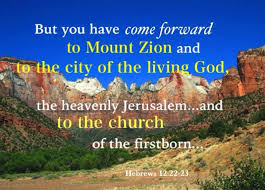 What God asks of us now under the New Covenant--instituted by Jesus at the Last Supper--is for us to die in the cross with Jesus and be infused by his resurrection life. He is then free to love through us.
It is quite impossible otherwise for us to live up to these two greatest commandments. It is certainly true that our responses to God's love for us change us over time.
What God asks of us now under the New Covenant--instituted by Jesus at the Last Supper--is for us to die in the cross with Jesus and be infused by his resurrection life. He is then free to love through us.
It is quite impossible otherwise for us to live up to these two greatest commandments. It is certainly true that our responses to God's love for us change us over time.
“I am the vine, you are the branches. He who abides in Me, and I in him, bears much fruit; for without Me you can do nothing.“ (John 15:5)
"Beloved, let us love one another, because love is from God; everyone who loves is born of God and knows God. Whoever does not love does not know God, for God is love. God’s love was revealed among us in this way: God sent his only Son into the world so that we might live through him. In this is love, not that we loved God but that he loved us and sent his Son to be the atoning sacrifice for our sins. Beloved, since God loved us so much, we also ought to love one another. No one has ever seen God; if we love one another, God lives in us, and his love is perfected in us.
By this we know that we abide in him and he in us, because he has given us of his Spirit. And we have seen and do testify that the Father has sent his Son as the Saviour of the world. God abides in those who confess that Jesus is the Son of God, and they abide in God. So we have known and believe the love that God has for us.
God is love, and those who abide in love abide in God, and God abides in them. Love has been perfected among us in this: that we may have boldness on the day of judgment, because as he is, so are we in this world. There is no fear in love, but perfect love casts out fear; for fear has to do with punishment, and whoever fears has not reached perfection in love. We love because he first loved us. Those who say, ‘I love God’, and hate their brothers or sisters, are liars; for those who do not love a brother or sister whom they have seen, cannot love God whom they have not seen. The commandment we have from him is this: those who love God must love their brothers and sisters also." (1 John 4:7-21)
King Ego must be crucified to start with. We cannot serve the Lord, because He is holy! At the end of Joshua's life the people all said they would serve the Lord faithfully after he was gone. Joshua knew better. Sure enough, four hundred years of disaster followed in the days of the Judges.
All our best efforts to serve God end up being merely manifestations of what the Bible calls "The Flesh!"
Then Joshua gathered all the tribes of Israel to Shechem, and summoned the elders, the heads, the judges, and the officers of Israel; and they presented themselves before God. And Joshua said to all the people, ‘Thus says the Lord, the God of Israel: Long ago your ancestors—Terah and his sons Abraham and Nahor—lived beyond the Euphrates and served other gods. Then I took your father Abraham from beyond the River and led him through all the land of Canaan and made his offspring many. I gave him Isaac; and to Isaac I gave Jacob and Esau. I gave Esau the hill country of Seir to possess, but Jacob and his children went down to Egypt. Then I sent Moses and Aaron, and I plagued Egypt with what I did in its midst; and afterwards I brought you out. When I brought your ancestors out of Egypt, you came to the sea; and the Egyptians pursued your ancestors with chariots and horsemen to the Red Sea. When they cried out to the Lord, he put darkness between you and the Egyptians, and made the sea come upon them and cover them; and your eyes saw what I did to Egypt. Afterwards you lived in the wilderness for a long time. Then I brought you to the land of the Amorites, who lived on the other side of the Jordan; they fought with you, and I handed them over to you, and you took possession of their land, and I destroyed them before you. Then King Balak, son of Zippor of Moab, set out to fight against Israel. He sent and invited Balaam son of Beor to curse you, but I would not listen to Balaam; therefore he blessed you; so I rescued you out of his hand. When you went over the Jordan and came to Jericho, the citizens of Jericho fought against you, and also the Amorites, the Perizzites, the Canaanites, the Hittites, the Girgashites, the Hivites, and the Jebusites; and I handed them over to you. I sent the hornet ahead of you, which drove out before you the two kings of the Amorites; it was not by your sword or by your bow. I gave you a land on which you had not laboured, and towns that you had not built, and you live in them; you eat the fruit of vineyards and olive groves that you did not plant.
‘Now therefore revere the Lord, and serve him in sincerity and in faithfulness; put away the gods that your ancestors served beyond the River and in Egypt, and serve the Lord. Now if you are unwilling to serve the Lord, choose this day whom you will serve, whether the gods your ancestors served in the region beyond the River or the gods of the Amorites in whose land you are living; but as for me and my household, we will serve the Lord.’
Then the people answered, ‘Far be it from us that we should forsake the Lord to serve other gods; for it is the Lord our God who brought us and our ancestors up from the land of Egypt, out of the house of slavery, and who did those great signs in our sight. He protected us along all the way that we went, and among all the peoples through whom we passed; and the Lord drove out before us all the peoples, the Amorites who lived in the land. Therefore we also will serve the Lord, for he is our God.’
But Joshua said to the people, ‘You cannot serve the Lord, for he is a holy God. He is a jealous God; he will not forgive your transgressions or your sins. If you forsake the Lord and serve foreign gods, then he will turn and do you harm, and consume you, after having done you good.’ And the people said to Joshua, ‘No, we will serve the Lord!’ Then Joshua said to the people, ‘You are witnesses against yourselves that you have chosen the Lord, to serve him.’ And they said, ‘We are witnesses.’ He said, ‘Then put away the foreign gods that are among you, and incline your hearts to the Lord, the God of Israel.’ The people said to Joshua, ‘The Lord our God we will serve, and him we will obey.’ So Joshua made a covenant with the people that day, and made statutes and ordinances for them at Shechem. Joshua wrote these words in the book of the law of God; and he took a large stone, and set it up there under the oak in the sanctuary of the Lord. Joshua said to all the people, ‘See, this stone shall be a witness against us; for it has heard all the words of the Lord that he spoke to us; therefore it shall be a witness against you, if you deal falsely with your God.’ So Joshua sent the people away to their inheritances." (Joshua 24:1-28)

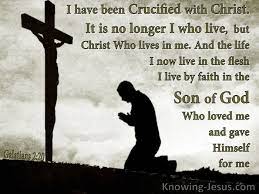 You and I are not able to live a life pleasing to God by our own self effort! The only victorious One is Jesus.
You and I are not able to live a life pleasing to God by our own self effort! The only victorious One is Jesus.
Then Jesus said to His disciples, “If anyone desires to come after Me, let him deny himself, and take up his cross, and follow Me. For whoever desires to save his life will lose it, but whoever loses his life for My sake will find it. For what profit is it to a man if he gains the whole world, and loses his own soul? Or what will a man give in exchange for his soul? For the Son of Man will come in the glory of His Father with His angels, and then He will reward each according to his works.“ (Matthew 16:24-27)
The term "Exchanged Life" is taken from the well-known passage in Isaiah 40:31. English translations refer to those who wait on or hope in the Lord as being able to "renew" their strength. Many commentaries and study Bibles that deal with this verse note that the literal translation of the Hebrew word for "renew" is "exchange." Those who wait on the Lord will exchange their strength for His strength, as stated in verses 25-30.
The term "Exchanged Life" is directly related to the believer's discovery of their new identity in Christ. The believer is a new creation; one born of God. What was once true is no longer true. J. Hudson Taylor made the English term "Exchanged Life" popular through his testimony of how God made him a new man. (From the book, Hudson Taylor's Spiritual Secret, chapter 14.) To elaborate further, we believe that the believer partakes of eternal life (Christ's Life) at the time of new birth, that identification with Christ in His crucifixion, burial, resurrection, and ascension brought the death of the "old man" and the life of the "new man." This may become a revealed experiential reality through a decision to lose one's life (total surrender) and to appropriate the Christ life by faith, and is continuously revealed by abiding in the Spirit and pursuing holiness. Victorious living is Christ living His life through the believer by the believer's faith and obedience under the Holy Spirit. This does not teach passivity, sinless perfection, or the deification of man. (http://www.elmco.org/about/the-exchanged-life)
When were you immersed into Christ? When you were baptized you will say. True. But water baptism points to a deeper, eternal reality.
“Or do you not know that as many of us as were baptized into Christ Jesus were baptized into His death? Therefore we were buried with Him through baptism into death, that just as Christ was raised from the dead by the glory of the Father, even so we also should walk in newness of life. For if we have been united together in the likeness of His death, certainly we also shall be in the likeness of His resurrection,
knowing this, that our old man was crucified with Him, that the body of sin might be done away with,
that we should no longer be slaves of sin. For he who has died has been freed from sin.
Now if we died with Christ, we believe that we shall also live with Him, knowing that Christ, having been raised from the dead, dies no more. Death no longer has dominion over Him. For the death that He died, He died to sin once for all; but the life that He lives, He lives to God.“ (Romans 6:1-10)
Over and over again God probes the inner man, the real person. His discerning eyes won’t allow us to hide behind social facades, adopted mannerisms or walls of materialism. Before God each man is seen just as he is. His innermost thoughts, thoughts he may wish to hide from the world, are exposed by the light of God. God requires us to keep all His statutes and laws, and yet which one of us can possibly keep all of them all the days of our lives? "Blessed are the pure in heart: for they shall see God."
What does it mean to be “in Christ?” This short phrase occurs seventy-eight times in the KJV New Testament. What does it mean in the New Testament that some people are “in Christ” while others are not? Where were these persons before they were “immersed into Christ?” What does it mean to be outside? Jesus died sins of the whole world but only a small percentage come to Jesus and become identified with Him by water baptism in His death, burial and resurrection.
1. We are Baptized into Christ and Baptized into his Death
“Or do you not know that as many of us as were baptized into Christ Jesus were baptized into His death? Therefore we were buried with Him through baptism into death, that just as Christ was raised from the dead by the glory of the Father, even so we also should walk in newness of life.
For if we have been united together in the likeness of His death, certainly we also shall be in the likeness of His resurrection, knowing this, that our old man was crucified with Him, that the body of sin might be done away with, that we should no longer be slaves of sin. For he who has died has been freed from sin. Now if we died with Christ, we believe that we shall also live with Him, knowing that Christ, having been raised from the dead, dies no more. Death no longer has dominion over Him. For the death that He died, He died to sin once for all; but the life that He lives, He lives to God. Likewise you also, reckon yourselves to be dead indeed to sin, but alive to God in Christ Jesus our Lord.
Therefore do not let sin reign in your mortal body, that you should obey it in its lusts. And do not present your members as instruments of unrighteousness to sin, but present yourselves to God as being alive from the dead, and your members as instruments of righteousness to God. For sin shall not have dominion over you, for you are not under law but under grace.” (Romans 6:3-14)
2. We Walk in Obedience to Jesus who is our Trailblazer.
"But what things were gain to me, these I have counted loss for Christ. Yet indeed I also count all things loss for the excellence of the knowledge of Christ Jesus my Lord, for whom I have suffered the loss of all things, and count them as rubbish, that I may gain Christ and be found in Him, not having my own righteousness, which is from the law, but that which is through faith in Christ, the righteousness which is from God by faith; that I may know Him and the power of His resurrection, and the fellowship of His sufferings, being conformed to His death, if, by any means, I may attain to the resurrection from the dead.3. We may be unpopular, and even suffer, or be killed simply because we are "in Christ."
Not that I have already attained, or am already perfected; but I press on, that I may lay hold of that for which Christ Jesus has also laid hold of me. Brethren, I do not count myself to have apprehended; but one thing I do, forgetting those things which are behind and reaching forward to those things which are ahead, I press toward the goal for the prize of the upward call of God in Christ Jesus.
Therefore let us, as many as are mature, have this mind; and if in anything you think otherwise, God will reveal even this to you. Nevertheless, to the degree that we have already attained, let us walk by the same rule, let us be of the same mind.
Brothers, join in following my example, and note those who so walk, as you have us for a pattern. For many walk, of whom I have told you often, and now tell you even weeping, that they are the enemies of the cross of Christ: whose end is destruction, whose god is their belly, and whose glory is in their shame—who set their mind on earthly things. For our citizenship is in heaven, from which we also eagerly wait for the Savior, the Lord Jesus Christ, who will transform our lowly body that it may be conformed to His glorious body, according to the working by which He is able even to subdue all things to Himself." (Philippians 3:7-21)
I say again, let no one think me a fool. If otherwise, at least receive me as a fool, that I also may boast a little. What I speak, I speak not according to the Lord, but as it were, foolishly, in this confidence of boasting. Seeing that many boast according to the flesh, I also will boast. For you put up with fools gladly, since you yourselves are wise! For you put up with it if one brings you into bondage, if one devours you, if one takes from you, if one exalts himself, if one strikes you on the face. To our shame I say that we were too weak for that! But in whatever anyone is bold—I speak foolishly—I am bold also.
Are they Hebrews? So am I. Are they Israelites? So am I. Are they the seed of Abraham? So am I. Are they ministers of Christ?—I speak as a fool—I am more: in labors more abundant, in stripes above measure, in prisons more frequently, in deaths often. From the Jews five times I received forty stripes minus one. Three times I was beaten with rods; once I was stoned; three times I was shipwrecked; a night and a day I have been in the deep; in journeys often, in perils of waters, in perils of robbers, in perils of my own countrymen, in perils of the Gentiles, in perils in the city, in perils in the wilderness, in perils in the sea, in perils among false brethren; in weariness and toil, in sleeplessness often, in hunger and thirst, in fastings often, in cold and nakedness— besides the other things, what comes upon me daily: my deep concern for all the churches. Who is weak, and I am not weak? Who is made to stumble, and I do not burn with indignation?
If I must boast, I will boast in the things which concern my infirmity. The God and Father of our Lord Jesus Christ, who is blessed forever, knows that I am not lying. In Damascus the governor, under Aretas the king, was guarding the city of the Damascenes with a garrison, desiring to arrest me; but I was let down in a basket through a window in the wall, and escaped from his hands.“ (2 Corinthians 11:16-33)
4. Jesus in us is a hidden treasure not recognized by the world.
But we have this treasure (Christ) in earthen vessels, that the excellence of the power may be of God and not of us. We are hard-pressed on every side, yet not crushed; we are perplexed, but not in despair; persecuted, but not forsaken; struck down, but not destroyed
— always carrying about in the body the dying of the Lord Jesus, that the life of Jesus also may be manifested in our body. For we who live are always delivered to death for Jesus’ sake, that the life of Jesus also may be manifested in our mortal flesh. So then death is working in us, but life in you.
And since we have the same spirit of faith, according to what is written, “I believed and therefore I spoke,” we also believe and therefore speak, knowing that He who raised up the Lord Jesus will also raise us up with Jesus, and will present us with you. For all things are for your sakes, that grace, having spread through the many, may cause thanksgiving to abound to the glory of God.
Therefore we do not lose heart. Even though our outward man is perishing, yet the inward man is being renewed day by day. For our light affliction, which is but for a moment, is working for us a far more exceeding and eternal weight of glory, while we do not look at the things which are seen, but at the things which are not seen. For the things which are seen are temporary, but the things which are not seen are eternal." (2 Corinthians 4:7-18)
In the article, Six hours in Eternity on the Cross, the crucifixion of Jesus was examined from an external vantage point -- as a reporter on the scene for the news media might have written it all down. Jesus' Death: Six Hours of Eternity on the Cross--the crucifixion of Jesus on April 15, 32 AD-- lasted only six hours according to Earth clocks and calendars. At the en, when His great work was finished, Jesus voluntarily “dismissed his spirit” and time traveled home to heaven. He returned from the dead alive and well on the third day after He died -- to the utter amazement of his disciples.
Those six hours in Earth time are really a Portal, a connection, leading outside of our present space-time domain into the vast unseen world of the spiritual. From what we are told elsewhere in the Bible concerning events “out there” we know Jesus did way more than merely die for all the sins of mankind since Adam. He was reconciling the whole world to Himself.
 At noon a mysterious, terrible darkness (not an ordinary eclipse of the sun) came upon the whole land of Israel, lasting for three hours. The rending of the veil of the temple separating the Holy Place and the Holy of Holies seems to have marked the words of Jesus, “It is finished.” Crucifixion Accounts from the Four Gospels. [See Synopsis of events of that week. For more on the nature of time, please see It's About Time.]
At noon a mysterious, terrible darkness (not an ordinary eclipse of the sun) came upon the whole land of Israel, lasting for three hours. The rending of the veil of the temple separating the Holy Place and the Holy of Holies seems to have marked the words of Jesus, “It is finished.” Crucifixion Accounts from the Four Gospels. [See Synopsis of events of that week. For more on the nature of time, please see It's About Time.]
“...And you, being dead in your trespasses and the uncircumcision of your flesh, He has made alive together with Him, having forgiven you all trespasses, having wiped out the handwriting of requirements that was against us, which was contrary to us. And He has taken it out of the way, having nailed it to the cross.
Having disarmed principalities and powers, He made a public spectacle of them, triumphing over them in the cross.” (Colossians 1:9 - 2:15)
When Jesus died on the Cross, to pay for your sins and mine, we were not yet born and had done nothing either good or bad. How could my entire history be transmitted from the history to that unique date in history? How could detailed records of every person who lived thousands of years before Jesus was born, affect this ordinary Jewish teacher. It is reasonable that 100 billion persons have been born, lived, and died since Adam. If the sins of that many persons were teleported to Jerusalem and placed on that man on the cross, in only three hours, the data transfer rate would have been enormous. Only by assuming that Cross is a portal between this life and the next can we even begin glimpse the reality of the universe as seen by God.
The crucifixion of Jesus is most important event in all history. No wonder the Apostle Paul said, "...it has now been revealed through the appearing of our Saviour Christ Jesus, who abolished death and brought life and immortality to light through the gospel." (2 Timothy 1:10). We can begin to understand why the Bible says of Jesus that He is “the Lamb of God slain before the foundation of the world” (Revelation 13:8)
In Revelation 5 Jesus is seen as the one unique man in all of history qualified to be entrusted with the title deed to the earth:
And I saw in the right hand of Him who sat on the throne a scroll written inside and on the back, sealed with seven seals. Then I saw a strong angel proclaiming with a loud voice, “Who is worthy to open the scroll and to loose its seals?” And no one in heaven or on the earth or under the earth was able to open the scroll, or to look at it. So I wept much, because no one was found worthy to open and read the scroll, or to look at it. But one of the elders said to me, “Do not weep. Behold, the Lion of the tribe of Judah, the Root of David, has prevailed to open the scroll and to loose its seven seals.” And I looked, and behold, in the midst of the throne and of the four living creatures, and in the midst of the elders, stood a Lamb as though it had been slain, having seven horns and seven eyes, which are the seven Spirits of God sent out into all the earth. Then He came and took the scroll out of the right hand of Him who sat on the throne.
Now when He had taken the scroll, the four living creatures and the twenty-four elders fell down before the Lamb, each having a harp, and golden bowls full of incense, which are the prayers of the saints. And they sang a new song, saying: “You are worthy to take the scroll, And to open its seals; For You were slain, And have redeemed us to God by Your blood Out of every tribe and tongue and people and nation, And have made us kings and priests to our God; And we shall reign on the earth.” Then I looked, and I heard the voice of many angels around the throne, the living creatures, and the elders; and the number of them was ten thousand times ten thousand, and thousands of thousands, saying with a loud voice: “Worthy is the Lamb who was slain To receive power and riches and wisdom, And strength and honor and glory and blessing!” And every creature which is in heaven and on the earth and under the earth and such as are in the sea, and all that are in them, I heard saying: “Blessing and honor and glory and power Be to Him who sits on the throne, And to the Lamb, forever and ever!” Then the four living creatures said, “Amen!” And the twenty-four elders fell down and worshiped Him who lives forever and ever.“ (Revelation 5)
But now Christ is risen from the dead, and has become the firstfruits of those who have fallen asleep. For since by man came death, by Man also came the resurrection of the dead. For as (all who are) in Adam all die, even so (all who are) in Christ all shall be made alive. But each one in his own order: Christ the firstfruits, afterward those who are Christ’s at His coming. Then comes the end, when He delivers the kingdom to God the Father, when He puts an end to all rule and all authority and power. For He must reign till He has put all enemies under His feet. The last enemy that will be destroyed is death. For “He has put all things under His feet.” But when He says “all things are put under Him,” it is evident that He who put all things under Him is excepted. Now when all things are made subject to Him, then the Son Himself will also be subject to Him who put all things under Him, that God may be all in all. (1 Corinthians 15:20-28)
Everyone was born a descendant of the first man Adam. Adam sin and all of Adam’s descendants have sinned leaving everyone who has ever lived guilty and lost (“original sin”). Everyone descended from the first Adam is invited to come “into the family of the Second (or “last”) Adam by trusting Jesus—and thus be completely be remade.
Therefore, if anyone is in Christ, he is a new creation; (kainos ktisis) old things have passed away; behold, all things have become new. Now all things are of God, who has reconciled us to Himself through Jesus Christ, and has given us the ministry of reconciliation, that is, that God was in Christ reconciling the world to Himself, not imputing their trespasses to them, and has committed to us the word of reconciliation. Now then, we are ambassadors for Christ, as though God were pleading through us: we implore you on Christ’s behalf, be reconciled to God. For He made Him who knew no sin to be sin for us, that we might become the righteousness of God in Him. (2 Corinthians 5:17-21)
But now the righteousness of God apart from the law is revealed, being witnessed by the Law and the Prophets, even the righteousness of God, through faith in Jesus Christ, to all and on all who believe. For there is no difference; for all have sinned and fall short of the glory of God, being justified freely by His grace through the redemption that is in Christ Jesus, whom God set forth as a propitiation (hilastērion) by His blood, through faith, to demonstrate His righteousness, because in His forbearance God had passed over the sins that were previously committed, to demonstrate at the present time His righteousness, that He might be just and the justifier of the one who has faith in Jesus. (Romans 3:21-26)
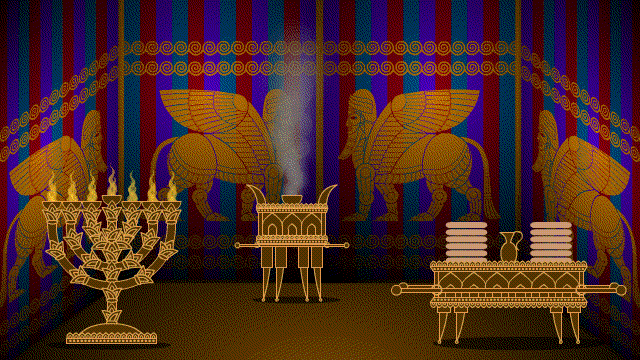
The Mercy Seat: "the lid or cover of the ark of the covenant," signifies the Propitiatory, so called on account of the expiation made once a year on the great Day of Atonement, Hebrews 9:5. For the formation see Exodus 25:17-21. The Hebrew word is kapporeth, "the cover," a meaning connected with the covering or removal of sin (Psalm 32:1) by means of expiatory sacrifice. This mercy seat, together with the ark, is spoken of as the footstool of God, 1 Chronicles 28:2; cp. Psalm 99:5; 132:7.
The Lord promised to be present upon it and to commune with Moses "from above the mercy seat, from between the two cherubim," Exodus 25:22. In the Septuagint. the word epithema, which itself means "a cover," is added to hilasterion; epithema was simply a translation of kapporeth; accordingly, hilasterion, not having this meaning, and being essentially connected with propitiation, was added. Eventually hilasterion stood for both. In 1 Chronicles 28:11 the Holy of Holies is called "the House of the Kapporeth."
Through His voluntary expiatory sacrifice in the shedding of His blood, under Divine judgment upon sin, and through His resurrection, Christ has become the Mercy Seat for His people. Expiation, a related word, is about paying back a debt that was owed so it is paid in full, and therefore a just transaction. Propitiation suggests paying back a debt owed but paying more than what was owe
Jesus is our sinbearer--He has carried all the sin, evil, death, sorrow and grief outside of our present space-time domain. This work Jesus accomplished once and for all on the cross. God sees the Cross as a done deal--thus we can speak of "The Finished Work of Christ." Nothing more needs to be added. The Cross can therefore be considered the Center of the created universe. We can neither add to nor extract from the finished work of Jesus on the Cross.
 Consider how our victory plan with God is all summed up for us in Colossians:
Consider how our victory plan with God is all summed up for us in Colossians: “...As you therefore have received Christ Jesus the Lord, so walk in Him, rooted and built up in Him and established in the faith, as you have been taught, abounding in it with thanksgiving.”Beware lest anyone cheat you through philosophy and empty deceit, according to the tradition of men, according to the basic principles of the world, and not according to Christ.
”For in Him dwells all the fullness of the Godhead bodily; and you are complete in Him, who is the head of all principality and power.
“...And you, being dead in your trespasses and the uncircumcision of your flesh, He has made alive together with Him, having forgiven you all trespasses, having wiped out the handwriting of requirements that was against us, which was contrary to us. And He has taken it out of the way, having nailed it to the cross. Having disarmed principalities and powers, He made a public spectacle of them, triumphing over them in the cross.” (Colossians 1:9 - 2:15)
“For though we walk in the flesh, we do not war according to the flesh. For the weapons of our warfare are not carnal but mighty in God for pulling down strongholds, casting down arguments and every high thing that exalts itself against the knowledge of God, bringing every thought into captivity to the obedience of Christ, and being ready to punish all disobedience when your obedience is fulfilled.“ (2 Corinthians 10:3-6)
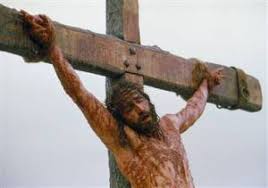 If you are "in Christ" and "Christ is in you" there is no evading your calling (and mine) to die to self daily. While Christ alone is our sin bearer we are called into the "fellowship of Christ's sufferings." When we are drawn by the Spirit into deeper union with our Lord, our subjective experience of time often slows down--as it did for Jesus on the cross. As noted, His six hours (according to earth time) were really an eternity according to the clocks of eternity!
If you are "in Christ" and "Christ is in you" there is no evading your calling (and mine) to die to self daily. While Christ alone is our sin bearer we are called into the "fellowship of Christ's sufferings." When we are drawn by the Spirit into deeper union with our Lord, our subjective experience of time often slows down--as it did for Jesus on the cross. As noted, His six hours (according to earth time) were really an eternity according to the clocks of eternity!
Not that I have already attained, or am already perfected; but I press on, that I may lay hold of that for which Christ Jesus has also laid hold of me. Brethren, I do not count myself to have apprehended;
but one thing I do, forgetting those things which are behind and reaching forward to those things which are ahead, I press toward the goal for the prize of the upward call of God in Christ Jesus.
Therefore let us, as many as are mature, have this mind; and if in anything you think otherwise, God will reveal even this to you. Nevertheless, to the degree that we have already attained, let us walk by the same rule, let us be of the same mind." (Philippians 3:12-16)
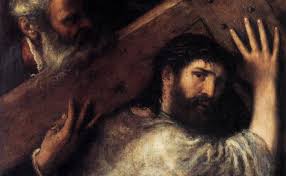
(2 Corinthians 4:10-11)
In the Cross | The Real Jesus | Glimpses of Jesus | The Cultural Church Papers
The Root Cause of Violence in the World | The Ego Papers |Fess Up
Paint or Get Off The Ladder -- Isaiah 58n} Nekrosis and Thanatos (Dying and Death)
The Body of Christ in Perilous Times | The Crucifixion of Jesus | Catharsis!
The Left Hand of God | The Return of the Landlord
The Dark Side | The Last Judgment | The Plight of the Homeless -- The Plight of the Rich | What is Money For Anyway?
Rapture Shock | The Near Future of Planet Earth | The Judgment Seat of Christ III
How Saved are You? | Zombified

The Holiness Papers | That Other Place (Hades, Hell) | The Lake of Fire | Tartarus the Lowest Level

Lambert Dolphin

Library
Library Annex (since 2018)

Email
Lambert Dolphin's Place
Recent and Recovered Articles
Newsletters Old and New
November 15, 2021. November 8, 2022.